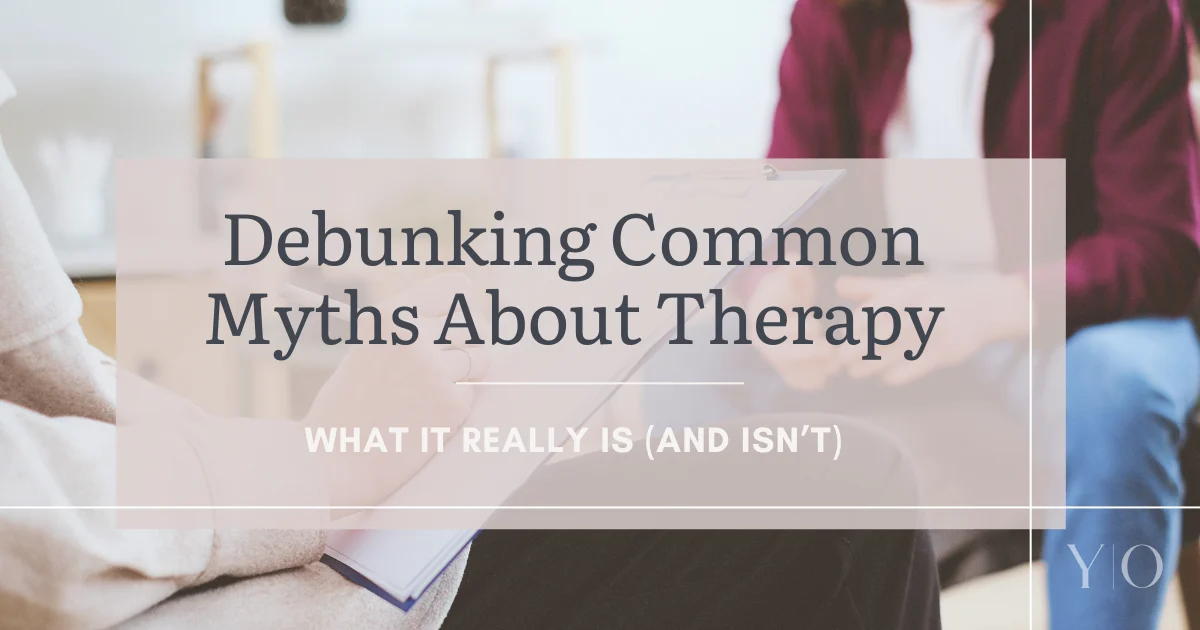Therapy is often misunderstood. Thanks to movies, social media, and cultural stereotypes many people have a skewed idea of what therapy actually involves. Some think it’s just getting advice, others believe it’s only for people in crisis, and many assume that talking about problems will make them worse. These misconceptions can prevent people from seeking the support they need. Let’s set the record straight and debunk some of the most common myths about therapy.
Table of Contents
Myth #1: Therapy Is Just Advice-Giving
Reality: Therapy is not about someone telling you what to do or offering quick-fix solutions. Instead, it’s a collaborative process where you and your therapist work together to explore your thoughts, emotions, and behaviors. The goal is to help you gain a deeper understanding of yourself, uncovering patterns and barriers that may be holding you back. Through this process, your therapist provides personalized tools, strategies, and insights tailored to your unique situation. By gaining self-awareness you can make choices that align with your values and goals, giving you tools and empowering you to create meaningful change in your life.
Myth #2: Therapy Is Just Like Talking to a Friend or Family Member
Reality: While talking to a friend or family member can offer emotional support, therapy is a distinct, professional process that brings specialized training, techniques, and expertise to the conversation. Unlike casual discussions, therapy provides a safe and structured environment where you can explore your thoughts and emotions in depth, without fear of judgment. Therapists are skilled at helping you identify patterns, develop effective coping strategies, and navigate complex feelings, all while keeping your best interests at the forefront.
While friends and family can offer support, therapy offers expertise and objectivity that lead to deeper insight and lasting change. Additionally, because therapy is removed from your personal relationships, it creates a unique space to focus solely on yourself. This allows for authentic self-exploration, free from concerns about how your thoughts or feelings might impact others, while also receiving unbiased feedback from a trained professional.
Myth #3: Talking About Things Doesn’t Really Change Anything
Reality: In a society where we often seek quick fixes like pills, potions, procedures, or special tools, it’s easy to overlook the power of talking things through. Therapy isn’t just about venting or recounting difficult experiences, it’s about creating understanding and learning new ways to approach life’s challenges. By discussing your thoughts and emotions with a trained professional, you gain clarity, insight, and a deeper understanding of yourself. This process helps you identify patterns, develop coping strategies, and ultimately find healthier ways to navigate difficult situations. Therapy also provides powerful tools, techniques, and strategies tailored to your unique needs.
Beyond the emotional benefits, there’s a growing body of research showing how therapy can physically change the way the brain processes information. Studies suggest therapy can reduce the reactivity of the amygdala, the brain’s center for fear and stress, leading to a calmer response to triggers. It can also increase activity in the frontal lobe, which is responsible for decision-making, problem-solving, and emotional regulation. This shift creates a better balance between the amygdala and frontal lobe, promoting healthier emotional responses. These brain changes are not just theoretical, they’re supported by scientific evidence demonstrating how therapy can help regulate stress hormones like cortisol, lower stress levels, and increase resilience. It can also boost the production of feel-good hormones like serotonin and oxytocin, improving mood and fostering connection. Additionally, therapy has been shown to enhance immune function, reduce inflammation, and improve sleep contributing to better overall physical health. Talking things through in therapy isn’t just about managing emotions, it’s a powerful tool for healing that impacts both the mind and body. With research supporting its lasting effects, therapy can be a crucial step toward healing, growth, and overall well-being.
Myth #4: Talking About Problems Makes Them Worse
Reality: Avoiding difficult emotions doesn’t make them go away, in fact, it often makes them stronger. Therapy provides a safe space to face and manage distressing thoughts and emotions skillfully, helping to reduce their intensity and frequency over time. Just like we learn to read, drive a car, or develop skills for our jobs, understanding how to navigate our emotions and thoughts effectively is something we must learn and practice. Simply experiencing emotions doesn’t mean we automatically know how to manage them, but with guidance and repetition, we can build the skills to handle them in a healthier way. By understanding and working through challenges, you gain greater control over them, rather than feeling controlled by them.
Myth #5: Therapy Is Only for People in Crisis
Reality: While therapy can be essential for those experiencing severe distress, it’s not just for crisis situations. Many people seek therapy to address everyday challenges such as managing stress, gaining clarity, or building healthier habits. Therapy is a space where you can develop new skills and approaches to navigate life’s ups and downs. Just as we learn new skills to tackle everyday tasks, therapy can help you manage life’s challenges with more ease and resilience. You don’t have to wait until things feel unmanageable to benefit from therapy.
Myth #6: Therapy Is a Never-Ending Process
Reality: Therapy isn’t meant to last forever. It’s designed to provide you with tools to navigate life’s challenges independently. Just like a doctor helps treat an illness or injury with the goal of recovery, therapy supports emotional and mental well-being by helping you build lasting skills. People engage in therapy for as long as they find it helpful and are working toward their goals, whether that means a short-term focus on a specific issue or longer-term support for deeper personal growth.
Myth #7: If I’m Strong, I Should Handle Things on My Own
Reality: Seeking therapy isn’t a sign of weakness, it’s a sign of self-awareness and strength. Just like a doctor conducts lab work and physical exams to diagnose what’s happening in the body before recommending treatment, therapy helps us understand what’s happening in our minds and bodies, how it affects us, and how to manage it effectively. We aren’t born knowing how to navigate difficult emotions or unhelpful thoughts, these are skills we must learn just like reading, driving, or mastering a profession. Therapy provides a space to develop those skills, giving us the tools to process experiences, respond in healthier ways, and ultimately improve our mental and emotional well-being.
Therapy: A Space for Growth, Not Just “Fixing” Problems
Therapy isn’t about someone telling you how to live your life. It’s about helping you uncover patterns, explore possibilities, and develop skills that empower you to live in alignment with your values. Whether you’re navigating a difficult time or simply want to understand yourself better, therapy can be a transformative tool for growth. If you’re considering therapy and want to learn more, contact Dr. Oren at 775-525-8100 today to explore how therapy can support your journey.
Please note that the information provided in this blog post is for informational purposes only and is not intended as a substitute for professional therapy or mental health treatment.



